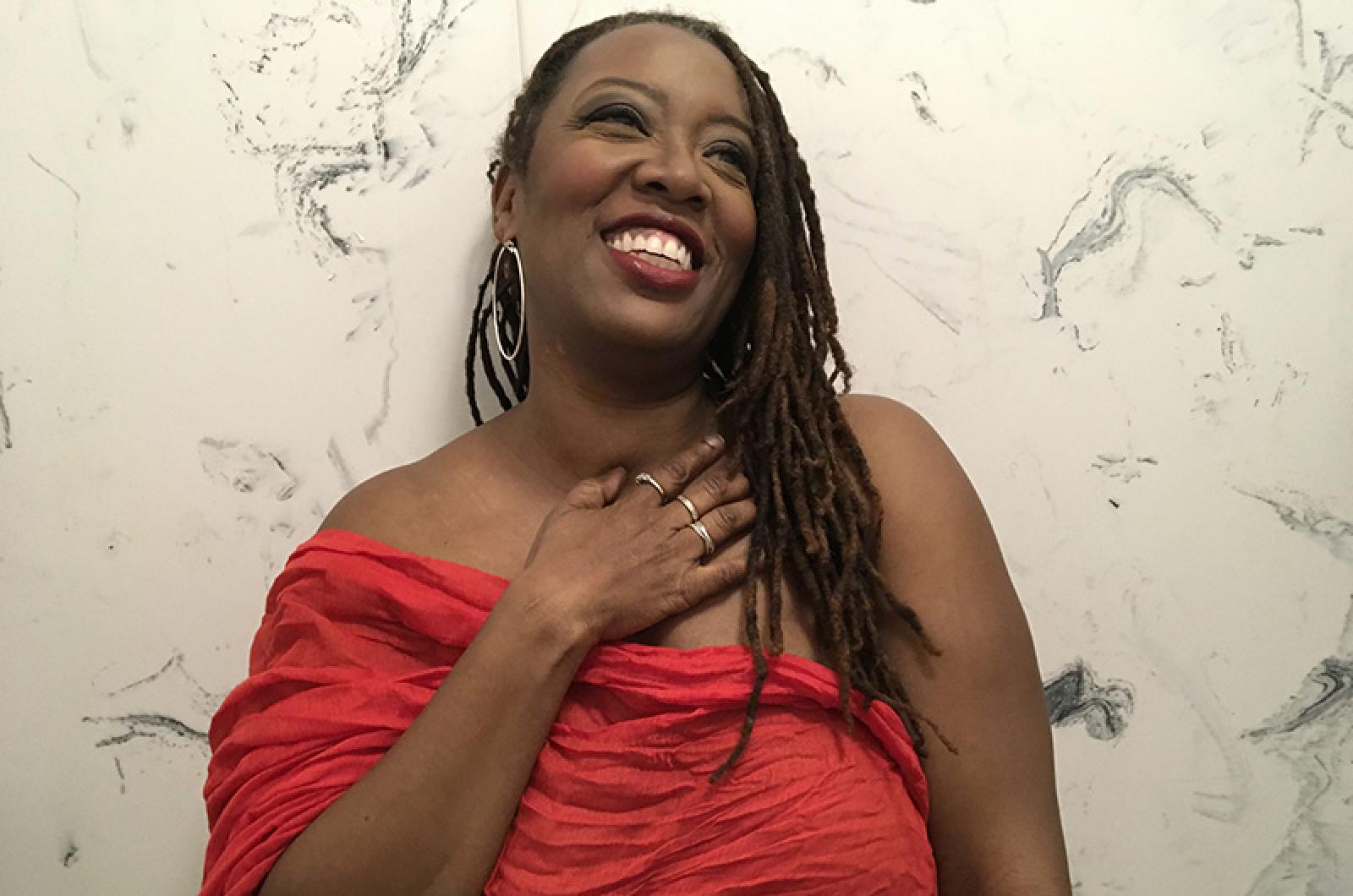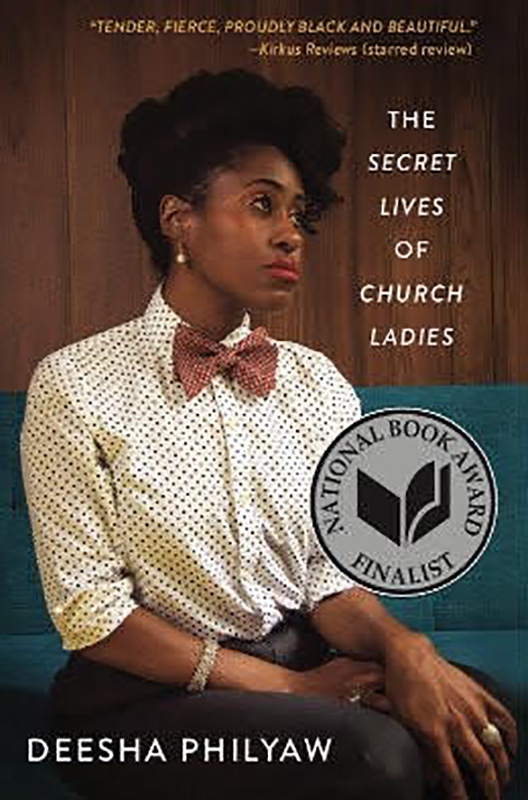Fiction readers can be glad that Deesha Philyaw’s oldest daughter had trouble napping.
As a stay-at-home mom, Ms. Philyaw struggled to find time to care for herself. She had been an elementary school teacher but now, with a new, restless baby, she had to find an outlet to fit into short, 30-minute bursts. She turned to writing, and although that was 20 years ago many of the ideas she wrestled with then form the basis for The Secret Lives of Church Ladies, the author’s short story collection published by West Virginia University Press last year.
A daughter cares for her Alzheimer’s-afflicted mother who wakes every day convinced that the lead singer of The O’Jays will return to romance her. Teenaged Jael is mighty suspicious of her best friend’s newfound relationship with a slick older man. Olivia watches hungrily as her mother makes peach cobbler for a man she mistakes for being God. A group of women write a letter to their unknown half-sister to tell her that their father has died.
These are a few of the unforgettable women found in The Secret Lives of Church Ladies. All are connected through Ms. Philyaw’s central themes: sex, Christianity, black churches, expectations for “good” women — and those who find freedom in secret longings, affairs and even unfaithfulness to the church.
Ms. Philyaw’s emotionally honest writing struck a chord with readers. The author won the 2021 PEN/Faulkner Award for Fiction, the 2020/2021 Story Prize, the 2020 L.A. Times Book Prize, and was a finalist for the 2020 National Book Award.
The success of Church Ladies comes years after Ms. Philyaw sat reading on the floor of the Jacksonville, Fla., public library or browsed the stacks at Yale as a first-generation college student majoring in economics. She has been writing for websites, corporations, individual business clients and national magazines for years. She also gained a national following after she and her ex-husband Michael D. Thomas published Co-Parenting 101 in 2013. That book took off, in part because the two took to blogging and social media, so audiences felt as though they really knew the couple.
“My freelance career was such a hodgepodge,” Ms. Philyaw recalled with a chuckle. “I was just desperate to get published.”
But her fiction wasn’t getting published — not yet. She wrote columns about parenting on the website Literary Mama and for the magazine Wonder Time. Her first national publishing credit came when reviewing parenting books for The Washington Post. Essays and op-eds in Essence and The New York Times would eventually follow. This spring, she drew attention for an op-ed on Bloomberg CityLab about the paradox of black women not thriving in Pittsburgh, where Ms. Philyaw has lived for more than 20 years, at a time when that city is gaining a national reputation for livability.
As she struggled to finish a novel, her agent Danielle Chiotti picked up on the “church lady” character strain in her short stories. Ms. Chiotti proposed that the author write three church lady stories that they could shop to publishers as a manuscript. Ms. Philyaw hadn’t noticed the recurring theme but became intentional in working on short stories focused on black women, sex and the black church.
She knew well the thoughts and emotions of her characters. As a black woman, she had been grappling with what her Southern, Christian upbringing meant.
“So many of us have been affected by the church’s teachings and had to get free and unlearn,” she explained. “When I first started writing, I identified as Christian and had a very elementary, evangelical view that everything you do has to honor God. I was writing fiction and since I had to honor God, everybody ended up going to church in the end.”
“I was also writing about sex but felt like it was wrong and had to be done in secret,” she added. “I had to hide it from my friends and family because it was not the kind of thing I should be writing. That’s such a simplistic, boring mindset around storytelling. As my understanding and my own spiritual journey shifted, I moved away from boxed-in thinking that these are the only kinds of stories I can write and celebrate. Once I got rid of that burden, I thought, I can write about anything I want.”
What she produced are “good stories” first and foremost — and stories under-represented in the marketplace, she said. Ms. Philyaw was influenced by “unapologetically black” writers like James Baldwin and Toni Morrison, and speaks with admiration for her own contemporary colleagues, Dawnie Walton and Sunny Hostin.
Ms. Philyaw noted that the current context for black stories is in an age of social justice upheaval. She and other black writers are also working in a publishing industry rampant with racial bias, she said.
“We’re not writing with white people learning in mind,” she said firmly. “That’s not the primary focus for any black writer I know right now. That doesn’t mean it doesn’t exist. But not in my circle of friends. I wrote these stories primarily for other black women. We are writing for us. If anybody else gets something out of it, that’s cool.”
The awareness by white readers, the uptick in book sales and the media focus are all welcome.
“But what all of us want is structural change and power shifts within a country where, politically, black people are disempowered and disenfranchised,” she said. “We’re publishing despite those things and hoping that there are better things on the horizon not only for us but for people coming behind us. Some of us are really invested in bringing people along. It’s not enough that we’re doing well. I want other black people to do well, too.”
Church Ladies was published amidst the pandemic and Ms. Philyaw describes her promotion of the book so far as being done sitting on her couch. Her participation in the Martha’s Vineyard Book Festival will be her first foray into the type of live events that constitute an author tour. She’s also looking forward to her first visit to the Island, particularly to beach walks and eating seafood.
Those Vineyard walks by the water will be calm respite before some big moves Ms. Philyaw has ahead. In the fall, she’ll take a first step of returning to her roots after decades in Pittsburgh during which she never shook nostalgia for the South. The Jacksonville library where she read as a child and worked at during high school has invited her for an appearance. And next fall, she will take up residence at University of Mississippi as the John and Renee Grisham Writer in Residence. She’s looking forward to living on the 77-acre Grisham estate after many years in urban and suburban environments.
Her year in Mississippi won’t just be spent enjoying the estate’s lighted tennis courts and fish pond, or visits from her daughters and other writer friends. Ms. Philyaw is intent on “finishing that dang novel,” she said with a laugh. There’s also work adapting Church Ladies for HBO Max. Westworld actress Tessa Thompson is executive producing, with Ms. Philyaw as co-screenwriter and producer.
Ms. Philyaw has a lot of stories to tell. And readers are eager for them.
Deesha Philyaw will talk part in a panel discussion entitled Mothers and Daughters on Friday at the Martha’s Vineyard Museum with Sadeqa Johnson and Torrey Peters. The event begins at 2 p.m. and is moderated by Dawn Davis. She will also participate in an author talk on Sunday at the Chilmark Community Center with Brandon Taylor entitled Short Stories/Telling Our Stories. The talk begins at 10 a.m. and is moderated by Geraldine Brooks.








Comments
Comment policy »